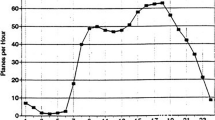Abstract
This paper investigates the interrelationship between the randomized F- policy and randomized N- policy in discrete-time queues with start-up time. The F-policy queuing system deals with the issue of controlling arrivals. The N-policy queueing system deals with the issue of controlling service, that is, when all the customers are served in the queue, the server is deactivated until N customers are accumulated in the queue. Using the recursive method, the steady-state probabilities are determined for both models. The relationships between the discrete-time G e o/G e o/1/K queues with (p, F)- and (q, N)-policies are established by a series of propositions. The benefit made by interrelationship is that the solution of one queue can be deduced from the other queue readily. Various performance measures and numerical results are carried out for illustration purposes. These queues are common in wireless communication systems, production systems, manufacturing systems.






Similar content being viewed by others
References
Baker, K.R.: A note on operating policies for the queue M/M/1 with exponential startups. INFOR 11, 71–72 (1973)
Borthakur, A., Medhi, J., Gohain, R.: Poisson input queueing systems with startup time and under control operating policy. Comput. Oper. Res. 14, 33–40 (1987)
Chang, C.J., Ke, J.C., Huang, H.I.: The optimal management of a queueing system with controlling arrivals. Journal of the Chinese Institute of Industrial Engineers 28, 226–236 (2011)
Chang, F.M., Ke, J.C.: Cost analysis of a two-phase queue system with randomized control policy. Procedia-Social and Behavioral Sciences 25, 137–146 (2011)
Gupta, S.M.: Interrelationship between controlling arrival and service in queueing systems. Comput. Oper. Res. 22, 1005–1014 (1995)
Karaesmen, F., Gupta, S.M.: Duality relations for queues with arrival and service control. Comput. Oper. Res. 24, 529–538 (1997)
Ke, J.C., Wang, K.H.: A recursive method for N-policy G/M/1 queueing system with finite capacity. Eur. J. Oper. Res. 142, 577–594 (2002)
Ke, J.C.: The operating characteristic analysis on a general input queue with N-policy and a startup time. Math. Methods Oper. Res. 57, 235–254 (2003)
Ke, J.C., Chang, F.M., Chang, C.J.: Controlling arrivals for a Markovian queueing system with a second optional service. Int. J. Ind. Eng-Theory 17, 48–57 (2010)
Kuo, C.C., Wang, K.H., Pearn, W.L.: The interrelationship between N-policy M/G/1/K and F-policy G/M/1/K queues with startup time. Quality Technology & Quantitative Management 8, 237–251 (2011)
Medhi, J., Templeton, J.G.: A poisson input queue under N-policy and with a general start up time. Comput. Oper. Res. 19, 35–41 (1992)
Moreno, P.: A discrete-time single-server queue with a modified N-policy. Int. J. Syst. Sci. 38, 483–492 (2007)
Moreno, P.: Analysis of a G e o/G/1 queueing system with a generalized N policy and setup-closedown times. Quality Technology & Quantitative Management 5, 111–128 (2008)
Tadj, L., Choudhury, G.: Optimal design and control of queues. TOP 13, 359–414 (2005)
Takagi, H.: A M/G/1/K queues with N-policy and setup times. Queueing Syst. 14, 79–98 (1993)
Wang, K.H., Ke, J.C.: A recursive method to the optimal control of an M/G/1 queueing system with finite capacity and infinite capacity. Appl. Math. Model. 24, 899–914 (2000)
Wang, K.H., Kuo, C.C., Pearn, W.L.: Optimal control of an M/G/1/K queueing system with combined F Policy and start-up time. J. Optim. Theory Appl. 135, 285–299 (2007)
Wang, K.H., Kuo, C.C., Pearn, W.L.: A recursive method for the F-policy G/M/1/K queueing system with an exponential startup time. Appl. Math. Model. 32, 958–970 (2008)
Wang, T.Y., Ke, J.C.: The randomized threshold for the discrete-time G e o/G/1 queue. Appl. Math. Model. 33, 3178–3185 (2009)
Wang, K.H., Yang, D.Y.: Controlling arrivals for a queueing system with an unreliable server: newton-quasi method. Appl. Math. Comput. 213, 92–101 (2009)
Yadin, M., Naor, P.: Queueing systems with a removable service station. J. Oper. Res. Soc. 14, 393–405 (1963)
Yang, D.Y., Wang, K.H., Pearn, W.L.: Optimization on (N, p)-policy for an unreliable queue with second optional service and start-up. Journal of the Chinese Institute of Industrial Engineers 28, 411–424 (2011)
Yang, D.Y., Wang, K.H.: Interrelationship between randomized F-policy and randomized N-policy queues. Journal of Industrial and Production Engineering 30, 30–43 (2013)
Author information
Authors and Affiliations
Corresponding author
Rights and permissions
About this article
Cite this article
Goswami, V. Relationship between randomized F-policy and randomized N-policy in discrete-time queues. OPSEARCH 53, 131–150 (2016). https://doi.org/10.1007/s12597-015-0220-y
Accepted:
Published:
Issue Date:
DOI: https://doi.org/10.1007/s12597-015-0220-y




